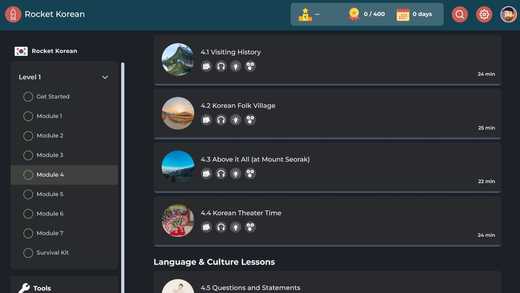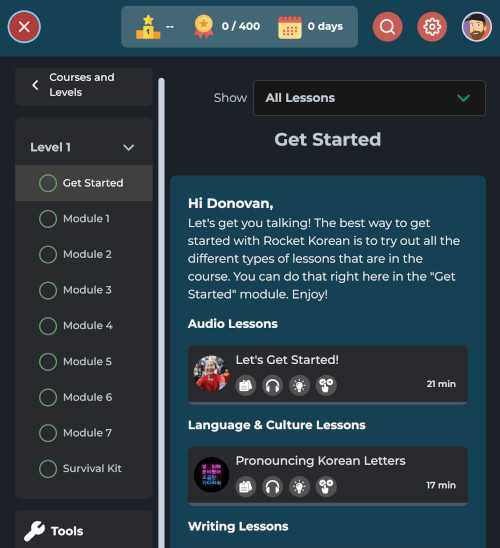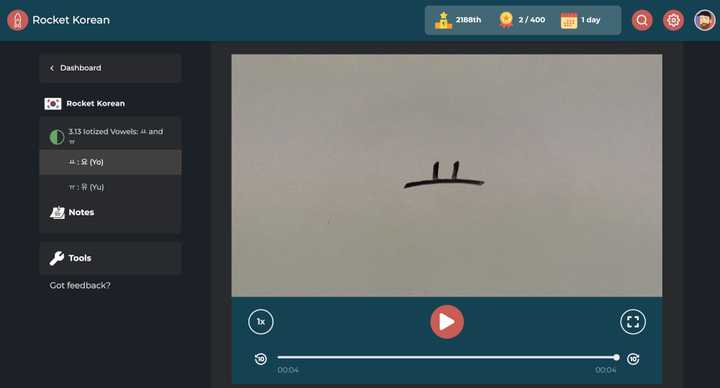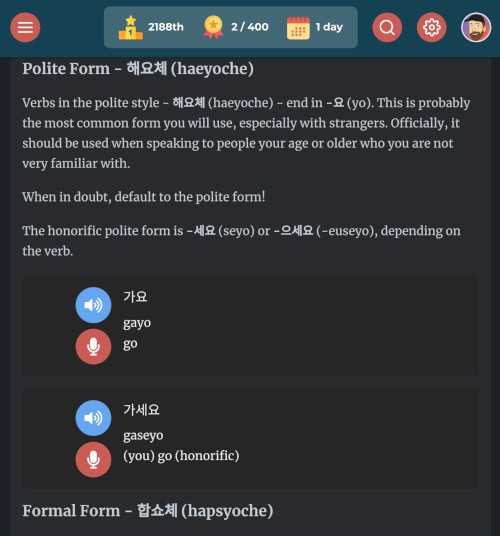Brutally Honest And Detailed Rocket Korean Review (2023 Edition)
 Written byHubert Nagel
Written byHubert Nagel- Read time11 mins
- Comments2


- Comprehensive
- High quality dialogues
- Free mobile app access included
- Inbuilt gamification and leaderboard
- Slightly pricey
- Inactive forums
- Spammy affiliates
Rocket Korean is one of the better Korean courses, is comprehensive in its content, covering all skills, and uses high quality, natural dialogues.
UPDATE: If you sign up to my mailing list, I’ll immediately send you a unique discount for Rocket Korean that’s only available to my readers.
When looking for a decent and reliable online course to learn Korean, there are a few that come to mind.
Back when I was living in South Korea doing my Korean language immersion, I relied heavily on TTMIK and YouTube to learn the foundations (as well as conversation on italki of course).
These were all tremendously useful but none could be described as a structured “course”.
It wasn’t until a while after I’d left Korea that I tried Rocket Korean finally.
I kind of wish I had known about it earlier.
The Korean edition of Rocket is unfortunately not as extensive as some of the other editions (e.g. Spanish and French) as it only covers Level 1 and does not include the second and third levels.
So basically it’s more suitable for Beginner Korean learners.
Note: They may end up adding the other levels soon as they recently did with Chinese.
Rocket Korean uses what I nicknamed the ‘chunking approach’ (my own method) which means that the Korean language lessons are offered in bite-size pieces/chunks rather than explicit grammar rules.
If you’re looking for something dense and academic then you’re better off with a textbook.
This course is about practical language use and it’s surprisingly good at covering a lot of content in a succinct and easy way.
Here’s a quick video demo that I put together a while back of an earlier edition (massively improved in the now-released 2023 edition) exploring some other language editions:
Rocket Korean has some notable differences which I’ll cover below.
First of all: What are the other alternatives to Rocket Korean?
I’m sure you’ve landed here after doing your research to see what’s available.
Here are my absolute go-to resources for learning Korean (and what I would recommend to anyone asking me):
Each of them are vastly different resources in their content, style and methodology so I’ll try and sum it up for you:
Rocket Korean is a linear, structured audio course that guides you through a linear learning path.
90 Day Korean is a popular “inner circle” course for learning Korean with 4 x 90 day modules.
Glossika Korean is a spaced repetition learning system (amazingly useful listening comprehension builder).
KoreanClass101 is a podcast + video collection – very good but not structured in the way that Rocket Korean is.
And italki is hands down the most important site for connecting you with Korean conversation partners and teachers.
You’ve also got the household names like Rosetta Stone, Pimsleur and Assimil. They’re all very well-known but in my opinion suffer major flaws (see my reviews).
But for structured, linear course style learning (something that guides you from A to B to Z), Rocket Korean is the only decent resource available.
Rocket Korean’s problem with infuriating spam affiliates
I’m sure you’ve had to sift through a tonne of spam to arrive here.
One of the chief concerns with Rocket Korean is that its affiliates are out of control making it hard to find reliable, honest reviews on the usefulness of the product.
I avoided using it for years because of this, in fact.
The one thing you won’t find on this blog are glowing recommendations for products that I would never honestly recommend to anybody.
Know that sales abuses aren’t connected to or controlled by Rocket Languages.
They’re harming Rocket’s reputation.
Honest disclosure: In the interests of full transparency, I occasionally use affiliate links on this site which means I do get a percentage on sales for products like Rocket Korean.
This helps me continue to provide high quality language content to my readers.
At first glance: Rocket Korean language course

One of the most common queries I get are comparisons between Rocket Korean and Rosetta Stone.
Which is odd because these products are totally different to each other.
I reviewed the Korean Rosetta Stone a while back and had some pretty sharp criticisms to share – while I think the program and learning style of RS is unique, it’s just too restrictive for one.
It requires you to learn Korean the way that they want you to.
Rocket Korean on the other hand gives you the freedom to learn the way you want to. It’s a structured course and is ideally used in a linear fashion but you can use it however you want to.
Want to skip lesson one and head straight for lesson 12? No problem.
It gives you the freedom to do that.
When you log in, you’re faced with 5 sections:
1. Language and Culture looks at the grammar and finer cultural points of Korean.
2. Interactive Audio contains all of the high quality dialogue lessons delivered in a podcast-style format.
3. Writing Lessons show you how to read and write using the Korean alphabet (very easy!).
4. The Survival Kit contains core lessons on vital topics in Korean (in my opinion the most ideal place to begin).
5. And Tools (contains flashcards, My Vocab and the forum).
The course goes into detail on areas such as sport, family, Korean cultural topics (e.g. soju, karaoke, honorifics), business and more.
What isn’t clear (and should be) is whether or not you should start with writing.
I would advise starting with the alphabet and then moving on to the other parts of the course even the menu placement would indicate that you do that later.
The Korean alphabet is so easy to learn that really nobody has an excuse for not learning it quickly.
Rocket Korean teaches the Korean alphabet well… mostly
The Korean edition of Rocket is one of the few editions with a strong focus on literacy skills.
This is because learning hangeul is so important.
If you live in Korea or intend to spend any amount of time there then you absolutely need to be able to read Korean letters (even if you don’t know much of the language). Menus and street signs are not always bilingual in Korea.
So I’m glad that Rocket Korean has invested a lot of time on this section.
The course teaches the alphabet in pairs – you can focus on 2 letters a day that way.
For each pair of letters, the videos couldn’t be simpler either. The teacher slowly writes the letter for you to copy (each video’s just a few seconds long).

They then provide some information and examples of the letter being used in different words (plus audio recordings).
Perhaps too simplified for some but overall it covers hanguel nicely.
Rocket Korean – My Tools – The Forum
Just to jump forward for a moment:
The Rocket Korean forum is one of the more disappointing aspects of the program.
This is something that most (though not all) of the other language editions suffer from – an almost completely dead user forum.
It’s difficult to know why this is.
Is it because most members don’t care about the community aspect of the course?
Some of the more recent and active contributors appear to be asking questions of a technical nature (e.g. why isn’t X working?).
I really feel that this one of the most poorly run features of Rocket Korean.
If more conversation was encouraged – asking questions about Korean, competitions, etc. – it’d be hugely beneficial to a lot of people.
One thing Rocket Korean gets right – honorific titles, levels of respect and banmal ()

This is one area in which Rosetta Stone failed miserably (I talked about it in my review).
Korean and Japanese are unique in the way they handle people of different ages and statuses addressing each other.
People basically speak using different vocab or altered word forms according to who they’re with. It’s quite complex and it’s one of the toughest aspects of Korean for a new learner to understand.
Most learners are at least aware of the use of the suffix – when talking to an inferior or younger person, this suffix is taken off words.
E.g. when telling a young student to sit down, you’d say “” but if you were telling an older colleague to sit down, you’d say “” (or even ).
Rocket Korean covers all of this in excellent detail with lots of quality audio examples.
Interactive Audio Lessons vs Language and Culture lessons in Rocket Korean
I should point out that it’s the interactive audio lessons alone that include multiple listening options.
These include:
- A main lesson podcast.
- Conversation role play.
- Full conversation.
- Lesson review.
The conversation takes place between Sujung and Taewoo, and you have the option of selecting role play to listen only to one of their dialogues.
This gives you a chance to play the role of the other person and respond in their place.
In addition to all this, you can scroll down and listen to the individual sentences and additional vocabulary, or use the record feature to test your pronunciation (which relies on the highly accurate Google Web Speech API).
The Language and Culture lessons don’t offer these interactive audio podcasts and conversations, but instead give you scenario sentences and dialogues to listen to and practice.
Rocket Korean would definitely benefit from including conversations in these lessons as well.
I can’t recommend the Rocket Korean mobile app enough
In my opinion it’s even better than the web version.
And free to use for members.
The lesson material is identical but the app just seems to run better for me on mobile and is a really distraction-free, sleek app to use.
It surprises me that it’s free and not a paid addon.
The Google Web Speech API works flawlessly on the app too.
For anyone who who commutes regularly, definitely download yourself the app.
Rocket Korean doesn’t prevent you from accessing what you’ve paid for
Unlike some other services I know of.
You need to be aware of 2 things regarding Rocket Korean:
- It’s a non-recurring subscription.
- You can access and download the entire course and you’re never restricted to using it online or in a program.
It’s becoming increasingly common for online language learning services to run on a subscription basis (e.g. paying every month to access the site). Rocket Korean is a once-off, lifetime subscription.
They may have plans to change this in future but for now I find this refreshing.
You pay once for Rocket Korean and own it for life.
Included in that is the fact that you 100% own what you pay for – the course is completely downloadable so if you want to store all the audio and lesson documents on your hard drive, print them out, put them on a mobile device for offline use – you can.
Other programs (like Rosetta Stone) don’t allow you to do this.
With Rocket you own what you pay for.
Tools: My Progress and My Vocab
I already mentioned the forum above which is a disappointment but there are two other tools that are done right in my opinion.
That is: My Progress (formerly called Leaderboard) and My Vocab.
One of my favorite features of Rocket Korean is in fact the My Vocab tool which is basically a dictionary that looks up any word – English or Korean – in the course and displays its various contexts and usages.
You can then listen to the word or dialogue sentences demonstrating how to use that word.
It’s remarkably useful.
You can also add it to your flashcard deck for later study.
The other included tool is the My Progress tab, which includes the leaderboard, study streaks and benchmark test (still in beta).
As you complete lessons and various other tasks in Rocket Korean, you earn points which can move you up the leaderboard, earning you badges. This is a way to compete with other members.
Gamified competition like this is highly useful as a motivator.
Rocket Korean pricing and refund policy
The cost of the single Rocket Korean level (with the auto-applied discounts) is as follows:
Lifetime purchase - $149.95 $99.95
Subscription access - $27 a month $19 a month
At various times throughout the year, Rocket Korean runs special promotions or sales which are good to look out for.
NOTE: You can also sign up to my mailing list (select Korean) and I’ll send you a unique discount for Rocket Korean immediately that’s only available to my readers.
Overall: Rocket Korean has surprising value despite an inactive forum and only having Level 1
I don’t know Rocket’s plans for Rocket Korean and whether or not they plan on releasing the next two levels soon.
It’s a perfect resource for low-level Korean learners and will probably get you to a comfortable level of proficiency.
Beyond that however, intermediate to advanced-level learners are better off with a package like the Korean edition of Glossika.
The mobile app is excellent, as is the fact that you can download 100% of the course content and not be forced to pay an ongoing subscription. The inactive forum is something I can look past.
Get a free trial account of Rocket Korean by clicking here:
What are your thoughts on Rocket Korean? Share below.
 Grab the link to this article
Grab the link to this article